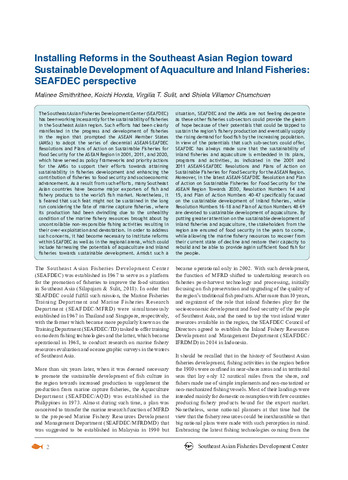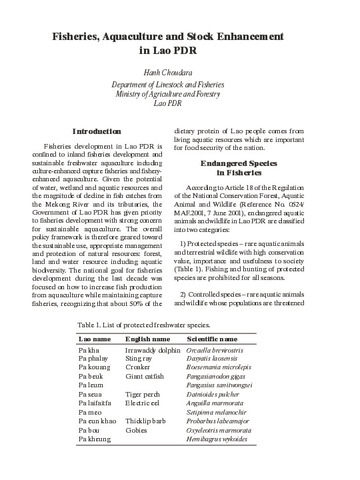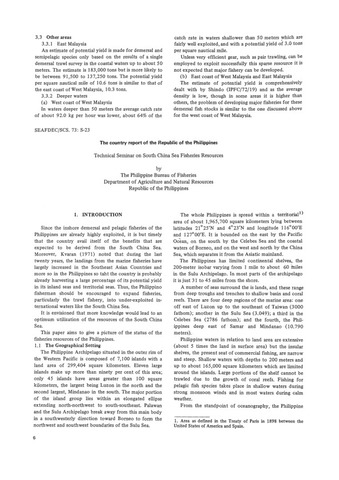Installing reforms in the Southeast Asian Region toward sustainable development of aquaculture and inland fisheries: SEAFDEC perspective

ရက်စွဲ
2021-01-30Page views
953
Share
စိတ္တဇ
The Southeast Asian Fisheries Development Center (SEAFDEC) has been working incessantly for the sustainability of fisheries in the Southeast Asian region. Such efforts had been clearly manifested in the progress and development of fisheries in the region that prompted the ASEAN Member States (AMSs) to adopt the series of decennial ASEAN-SEAFDEC Resolutions and Plans of Action on Sustainable Fisheries for Food Security for the ASEAN Region in 2001, 2011, and 2020, which have served as policy frameworks and priority actions for the AMSs to support their efforts towards attaining sustainability in fisheries development and enhancing the contribution of fisheries to food security and socioeconomic advancement. As a result from such efforts, many Southeast Asian countries have become major exporters of fish and fishery products to the world’s fish market. Nonetheless, it is feared that such feat might not be sustained in the long run considering the fate of marine capture fisheries, where its production had been dwindling due to the unhealthy condition of the marine fishery resources brought about by uncontrollable non-responsible fishing activities resulting in their over-exploitation and devastation. In order to address such concerns, it had become necessary to institute reforms within SEAFDEC as well as in the regional arena, which could include harnessing the potentials of aquaculture and inland fisheries towards sustainable development. Amidst such a situation, SEAFDEC and the AMSs are not feeling desperate as these other fisheries sub-sectors could provide the gleam of hope because of their potentials that could be tapped to sustain the region’s fishery production and eventually supply the rising demand for food fish by the increasing population. In view of the potentials that such sub-sectors could offer, SEAFDEC has always made sure that the sustainability of inland fisheries and aquaculture is embedded in its plans, programs and activities, as indicated in the 2001 and 2011 ASEAN-SEAFDEC Resolutions and Plans of Action on Sustainable Fisheries for Food Security for the ASEAN Region. Moreover, in the latest ASEAN-SEAFDEC Resolution and Plan of Action on Sustainable Fisheries for Food Security for the ASEAN Region Towards 2030, Resolution Numbers 14 and 15, and Plan of Action Numbers 40–47 specifically focused on the sustainable development of inland fisheries, while Resolution Numbers 16–18 and Plan of Action Numbers 48–69 are devoted to sustainable development of aquaculture. By putting greater attention on the sustainable development of inland fisheries and aquaculture, the stakeholders from the region are ensured of food security in the years to come, while allowing the marine fishery resources to recover from their current state of decline and restore their capacity to rebuild and be able to provide again sufficient food fish for the people.
Suggested Citation
Smithrithee, M., Honda, K., Sulit, V. T., & Chumchuen, S. V. (2021). Installing reforms in the Southeast Asian Region toward sustainable development of aquaculture and inland fisheries: SEAFDEC perspective. Fish for the People , 19(1), 2-9. http://hdl.handle.net/20.500.12066/6676
ဘာသာရပ်
စုစည်းမှုများ စုစည်းမှုများ
Related items
Showing items related by title, author, creator and subject.
-
Status of Fishing Conditions in Cambodia
Sour, Kim; Vuthy, Ros (Training Department, Southeast Asian Fisheries Development Center, 1997)Fisheries in plays a very important role in Cambodia’s national economic development. Total fish catch production in 1996 was 104 310 tones, about which 60% was contributed by inland capture fisheries, 30% by marine capture ... -
Fisheries, aquaculture and stock enhancement in Lao PDR
Choudara, Hanh (Aquaculture Department, Southeast Asian Fisheries Development Center, 2006)Fisheries development in Lao PDR is confined to inland fisheries development and sustainable freshwater aquaculture including culture-enhanced capture fisheries and fishery-enhanced aquaculture. Given the potential of ... -
The country report of the Republic of the Philippines: Technical seminar on South China Sea fisheries resources
The Philippine Bureau of Fisheries, Department of Agriculture and Natural Resources (Japan International Cooperation Agency, 1977)The paper provides information on the status of the fisheries resources in the Philippines. It presented data on the pelagic, demersal and other resources including aquaculture and minor sea products. The productions of ...




